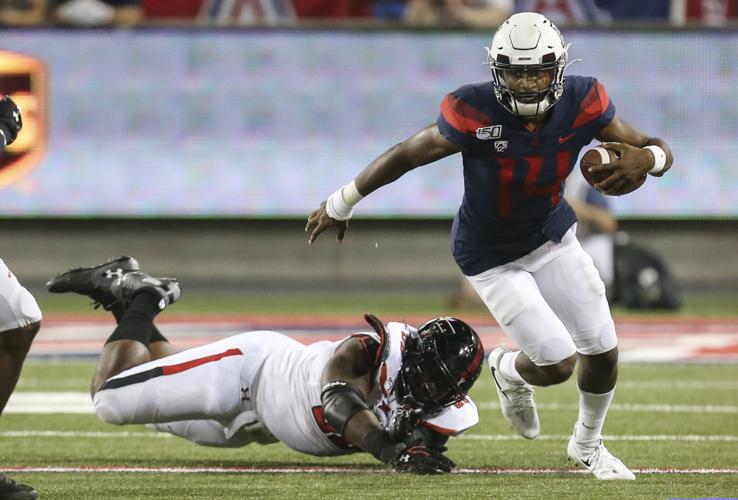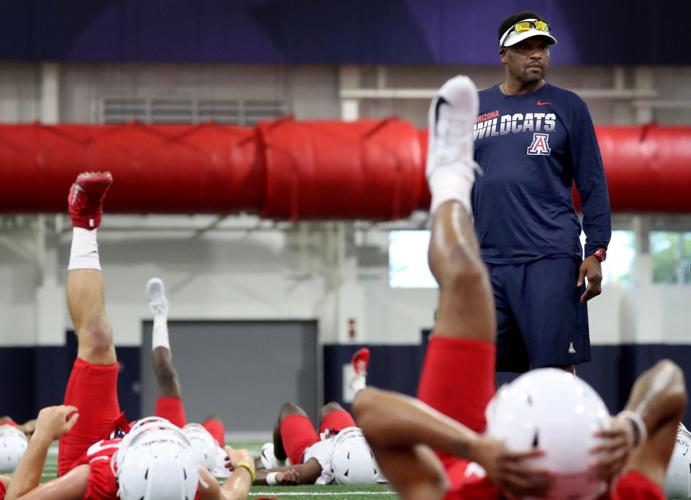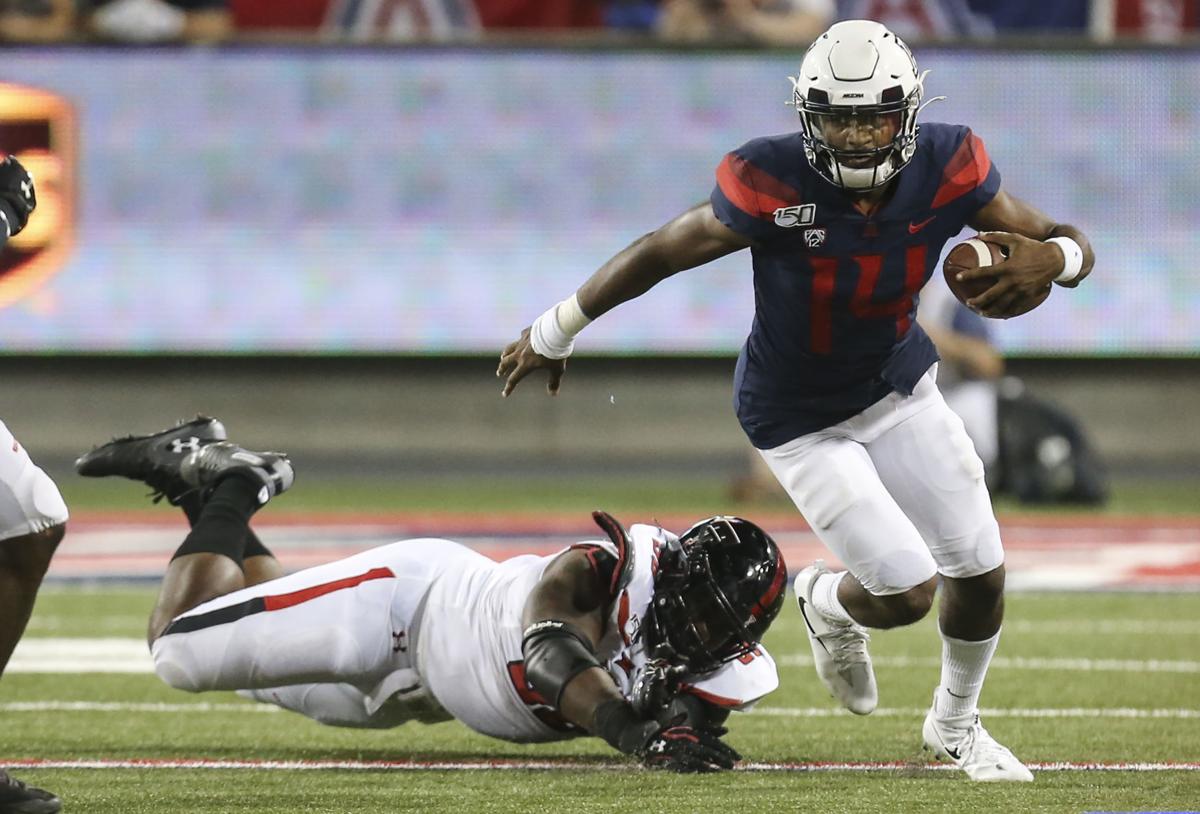We all know what happened the last time the Arizona Wildcats visited Colorado. It was truly memorable.
What has transpired since away from the friendly confines of Arizona Stadium has been mostly forgettable.
Since Khalil Tate became KHALIL TATE!!! on Oct. 7, 2017, in Boulder, Arizona has won two road games in 10 tries. Throw in the ’17 Foster Farms Bowl, and the Wildcats are 2-9 away from home since that magical evening in Colorado.
With a return trip on tap, Kevin Sumlin and his team have devised a psychological strategy to try to reverse their road woes: They are proceeding as if they never happened — or at least as if they happened to some other squad.
“I think this team is different,” Sumlin said. “Last year, how we played on the road, I’m not real concerned about it. What I am concerned about is right now. I think this team’s get some juice. They’ve got some confidence. I think we’ve got more depth. And we’re an older team.”
Arizona (3-1, 1-0 Pac-12) has won three straight games — all at home. The forget-the-past narrative promoted by Sumlin and several players this week also conveniently ignores this season’s opener, which took place on the road and resulted in a UA defeat.
But one could argue that the “Week Zero” Hawaii game is almost a separate entity — a short-film prequel to the main feature. When the Wildcats kick off against the Buffaloes (3-1, 1-0), six weeks will have passed since that 45-38 loss to the Rainbow Warriors.
“As Coach Sumlin said, this year we’re kind of a new team,” senior offensive lineman Cody Creason said. “So we try not to dwell on the past. Obviously, we didn’t win our first road game, but we’re looking to change that this game.”
The rhetoric entering the Hawaii game was similar to what was said this week: Arizona is a new team, a different team. That was then, this is now.
The Wildcats didn’t show it in Honolulu, but they have displayed signs of growth since. They are unquestionably a more confident club. They have figured out what their best lineups look like. And they have improved drastically on defense.
Arizona allowed fewer points in its past two games (31) than it did in three quarters at Hawaii (35).
What changed?
“We don’t want to lose no more,” defensive end JB Brown said. “We came back, and it seemed like everybody turned their backs on us after that one game. They just gave up on us. So we kept it as, we don’t need anybody. We got us.
“That’s how we’re gonna keep playing. We play for each other. Don’t listen to the outside noise.”
The in-stadium noise — its timing, its volume — isn’t the only difference between playing at home and on the road. But it might be the biggest one.

Arizona coach Kevin Sumlin said his team, which has won three in a row since losing the opener at Hawaii, “has got some juice. They’ve got some confidence.”
Tate has dealt with it before. However, his availability is uncertain because of hamstring and ankle injuries that kept him on the sideline last week. He likely will be a game-day decision.
Freshman Grant Gunnell started in Tate’s stead and performed well, completing 29 of 44 passes for 352 yards and a touchdown in Arizona’s 20-17 win over UCLA. But doing that at home is one thing; doing it on the road is another.
Sumlin is keen on sideline communication, which becomes more challenging in places like Colorado’s Folsom Field. It’s also more difficult to change plays and avoid false starts when the crowd is howling. The Wildcats relied heavily on pre-snap sideline checks with Gunnell behind center. The operation went smoothly. But four of Arizona’s 10 penalties were false starts.
The difference between playing at home and on the road for an inexperienced quarterback has been evident elsewhere in the Pac-12 South. Kedon Slovis led USC to victory at home against Stanford, then lost on the road against BYU. The same happened to Matt Fink against Utah and Washington after Slovis got hurt.
“When you go on the road, it’s just you. So it’s a different environment,” Sumlin said. “But I think these guys will be able to handle it a little bit better just because of the number of guys we have that have played, even though they’re not seniors.”
Arizona has started seven seniors through four games. But 17 starters are in at least their third year of Division I football (redshirt sophomore or older).
One of those veterans, receiver Brian Casteel, said the Wildcats are approaching this road challenge — and the four others that lie ahead — with a “1-0 mentality.”
“We can’t really focus on the past, because that’s the past,” Casteel said. “We’ve got to focus on the present. And just focus on being 1-0.”
To pull it off, Arizona must start faster on offense. Unproductive early possessions have undermined the Wildcats in several recent road setbacks. In lopsided losses last year at Houston, Utah and Washington State, Arizona scored only once on the first drive of a half.
At Hawaii, the Wildcats came up empty on the first three series of each half. They played from behind for most of the game. That’s an undesirable position, regardless of who plays quarterback.
It didn’t take long after the UCLA game for UA players to turn their attention to what was coming next. Just minutes into the postgame news conference, junior linebacker Colin Schooler — unprompted — addressed Arizona’s issues away from Tucson.
“We’ve got a game next week on the road,” Schooler said. “Based on our past, we don’t really play to our full potential on the road. So we’re focusing on getting a road win.”
Schooler knows what that feels like. His pass breakup in the back of the end zone on a two-point try sealed a 45-44 triumph in double overtime vs. Cal two weeks after the victory at Colorado. It was the Wildcats’ third road win in a row.
Since then, Arizona has notched just one, at Oregon State last September.
It’s been a while.






